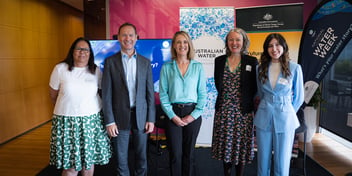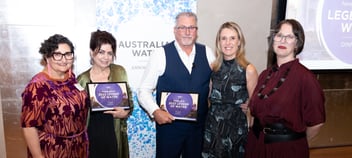‘Extreme solutions’ for NSW towns following bushfires, heavy rain
Residents in New South Wales’ (NSW) Bega Valley Shire are on level 4 water restrictions after torrential rain in the bushfire-ravaged area led to extremely poor water quality.
The Brogo-Bermagui water supply, which is fed by the Brogo Dam and the Brogo River, provides water to a number of communities in the state’s south-east. The catchment was hard hit by bushfires this summer, with the Werri Berri and Badja Forest Road fires burning more than 336,000 ha.
Torrential rain helped bring all fires in the area under control last week and saw the Brogo Dam rise from 10% capacity to overflowing.
While the rain was welcome, Bega Valley Shire Council’s Water and Sewer Manager Chris Best said it created challenging conditions for water management.
He said NSW Health had advised the council that the water should not have turbidity higher than 5 Nephelometric Turbidity Units (NTU). The water in the dam and river system is currently 600 NTU.
“The water flowing into the dam is full of sediment, ash, soot and debris,” Best said.
“With the turbidity levels being measured at well over 100 times the critical control level, the Brogo River supply has been isolated and emergency measures put in place.”
These measures include carting up to 1 ML of water per day from Bega, re-commissioning the supply of water from Couria Creek Weir and installing flocculation and sedimentation tanks at Brogo.
The council has also implemented level 4 water restrictions for towns and villages connected to the Brogo-Bermagui water supply system, including: Quaama, Cobargo, Bermagui, Beauty Point, Fairhaven, Wallaga Lake, Wallaga Lake Heights, Akolele and Wallaga Lake Koori Village.
Under level 4 restrictions, water may only be used outdoors for essential health and safety purposes.
“Extreme circumstances require extreme solutions, and that is most certainly the case with the work currently being done to secure the safe supply of water to the communities in the north of our Shire,” a statement from Bega Valley Shire Council said.
Avoiding a boil water alert
With trucking in water costing about $30,000 per day, Best said it was vital that residents reduced their consumption, both indoors and outdoors.
Without a significant demand in reduction there is a possibility the council will need to resupply water from the Brogo River before it has reached the desired quality levels.
If this happens, the water supplied to the system will likely be discoloured, with a noticeably smoky taste and smell. Boiling water will likely be required to disinfect all water used for drinking or cooking.
"[The water] is not suitable for drinking or even washing clothes with at the moment, so it’s a big challenge in terms of treatment and we really need to see how the dam behaves and whether that sediment settles down over the next couple of weeks,” Best said.
“If this persists with us trucking water, we’ll have to stop eventually and go to boil water. The less water we use, the longer we can stay out of a boil water notice.”
Planning and preparation
The council could respond quickly to the water quality challenges as it planned ahead, Best said.
“At the beginning of January, as soon as the fires had come through, we knew the catchment would be impacted so we started planning how we could get water from Bega to Bermagui in a hurry,” he said.
“We did some works to allow large tankers to get across bridges ... and pump into tanks so Bermagui and other areas could use that water.
“Because we had that lead time we managed to put that plan into place, but it becomes very expensive.”
The council is also working with the Australian Defence Force to secure a portable water treatment plant. NSW Health, WaterNSW and the Department of Planning, Industry and Environment are also providing advice and support.


